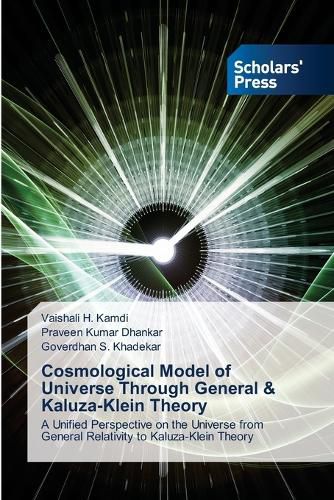Readings Newsletter
Become a Readings Member to make your shopping experience even easier.
Sign in or sign up for free!
You’re not far away from qualifying for FREE standard shipping within Australia
You’ve qualified for FREE standard shipping within Australia
The cart is loading…






This title is printed to order. This book may have been self-published. If so, we cannot guarantee the quality of the content. In the main most books will have gone through the editing process however some may not. We therefore suggest that you be aware of this before ordering this book. If in doubt check either the author or publisher’s details as we are unable to accept any returns unless they are faulty. Please contact us if you have any questions.
General Relativity (GR) is a cornerstone of modern physics, describing gravity as the curvature of space-time due to the presence of mass and energy. It provides a mathematical foundation for understanding gravitational interactions, including the bending of light by massive objects. Cosmology, a distinct scientific discipline, applies GR to study the universe's large-scale structure and evolution through mathematical modeling. In recent years, higher-dimensional theories such as Kaluza-Klein (KK) theory have attracted significant interest in cosmology and astrophysics. Introduced by Theodor Kaluza and Oskar Klein, this theory extends GR into a five-dimensional framework, offering potential insights into unifying gravity with other fundamental forces. It posits that our four-dimensional universe may have emerged from a higher-dimensional phase, where additional spatial dimensions became compactified and unobservable over time. By incorporating higher-dimensional space-time theories into cosmology, this work aims to provide a deeper understanding of the early universe and its large-scale dynamics, offering new perspectives on fundamental questions about cosmic evolution.
$9.00 standard shipping within Australia
FREE standard shipping within Australia for orders over $100.00
Express & International shipping calculated at checkout
Stock availability can be subject to change without notice. We recommend calling the shop or contacting our online team to check availability of low stock items. Please see our Shopping Online page for more details.
This title is printed to order. This book may have been self-published. If so, we cannot guarantee the quality of the content. In the main most books will have gone through the editing process however some may not. We therefore suggest that you be aware of this before ordering this book. If in doubt check either the author or publisher’s details as we are unable to accept any returns unless they are faulty. Please contact us if you have any questions.
General Relativity (GR) is a cornerstone of modern physics, describing gravity as the curvature of space-time due to the presence of mass and energy. It provides a mathematical foundation for understanding gravitational interactions, including the bending of light by massive objects. Cosmology, a distinct scientific discipline, applies GR to study the universe's large-scale structure and evolution through mathematical modeling. In recent years, higher-dimensional theories such as Kaluza-Klein (KK) theory have attracted significant interest in cosmology and astrophysics. Introduced by Theodor Kaluza and Oskar Klein, this theory extends GR into a five-dimensional framework, offering potential insights into unifying gravity with other fundamental forces. It posits that our four-dimensional universe may have emerged from a higher-dimensional phase, where additional spatial dimensions became compactified and unobservable over time. By incorporating higher-dimensional space-time theories into cosmology, this work aims to provide a deeper understanding of the early universe and its large-scale dynamics, offering new perspectives on fundamental questions about cosmic evolution.